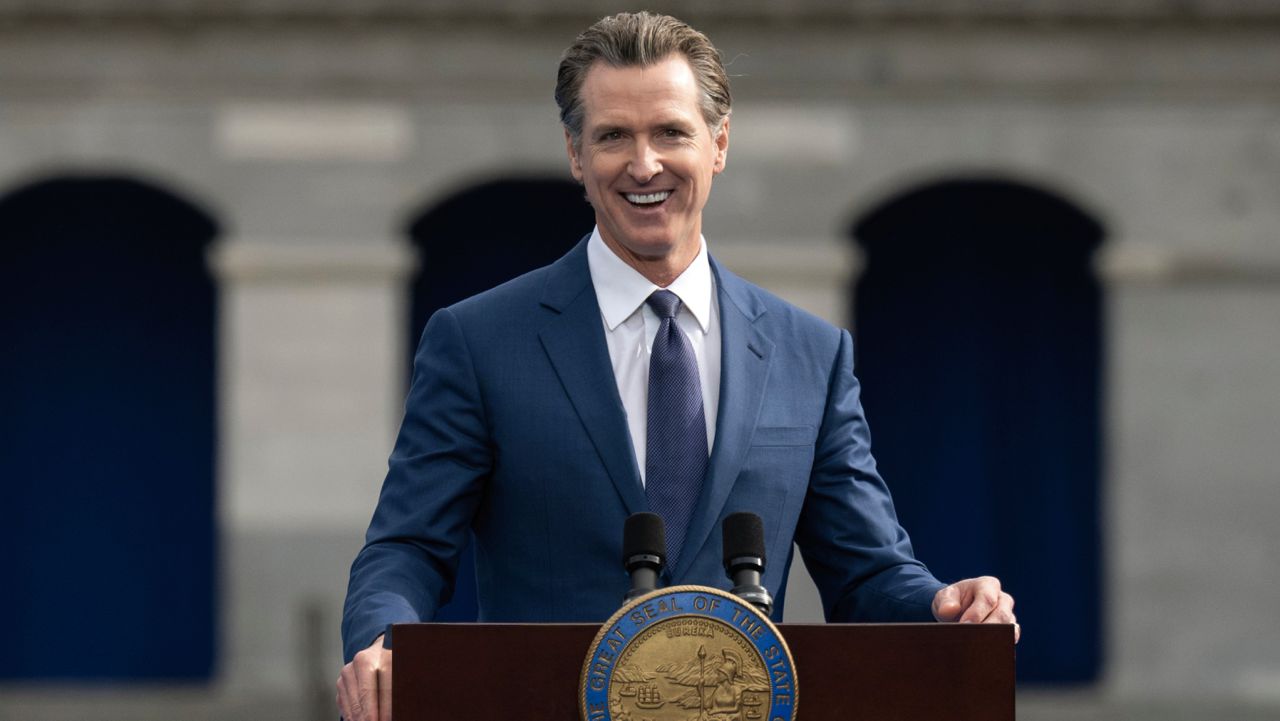SACRAMENTO, Calif. (AP) — California Gov. Gavin Newsom may be fresh off a campaign victory, but on Friday he talked like a politician ready for a fight as he held up his state as a beacon of freedom amid what he called a “rising tide of oppression" in Republican-led states.
“The battle lines, they're drawn. I'll say it: Once again, it is time for choosing," Newsom declared during an inaugural address in front of the state Capitol to kick off his second and final term leading the nation's largest Democratic stronghold.
Though he didn't name names, Newsom's targets were obvious as he decried “small men in big offices."
He chose Jan. 6 for his inaugural ceremonies to mark the second anniversary of the violent attack by Trump supporters on the U.S. Capitol, and he's spent the past year decrying Republican Govs. Ron DeSantis of Florida and Greg Abbott of Texas. At one point, he called out politicians who “demonize Mickey Mouse," a reference to Florida's ongoing battles with Disney.
“The ugliness that overflowed on January 6th, 2021, we know this, was in fact decades in the making — fomented by people who have a very different vision of America’s future,” Newsom said.
Newsom's remarks, reminiscent at times of a campaign stump speech, came after he led a march alongside his wife and four children through downtown Sacramento to the Capitol. The sun was finally out after days of relentless winds and rain pounding much of the state, with more storms set to arrive in the coming days.
As he pitched California as the nation's leading defender of freedom, Newsom touched only briefly on the state's struggles, including an unabated homelessness crisis, and offered few policy specifics for his second term.
California Republicans were quick to point out the state's challenges, including high energy and gas prices and the state's projected $25 billion budget deficit for the coming year.
“Now that California is facing a massive budget shortfall, these crises will only get worse unless the governor changes course and focuses on the issues facing our state. Texas and Florida are doing just fine on their own, and welcoming more Californians escaping our problems each day,” Assemblyman James Gallagher, the chamber’s Republican leader, said in a statement.
Newsom easily won his second term, less than 15 months after beating back a Republican-led recall effort.
He began his first term in 2019 with Trump as a clear foil in Washington. With Biden now in the White House, Newsom has pivoted his fire toward fellow governors, particularly DeSantis.
He continued to draw that contrast Friday, decrying states that “make it harder to vote and easier to buy illegal guns," and that “silence speech, fire teachers, kidnap migrants, subjugate women."
Both Newsom and DeSantis are widely seen as future presidential contenders, though perhaps not against each other. Newsom has committed to supporting Biden if the president seeks a second term, as he currently plans to do. DeSantis, meanwhile, has not ruled out a 2024 run — even as Trump seeks a return to the White House.
Their competing visions of governance — including how best to promote “freedom" — showcase the political polarization that's taken hold across the nation. In his own inaugural address Tuesday, DeSantis touched on national issues like immigration and inflation, and decried “wokeness."
Hundreds of people, including fellow Democratic leaders like U.S. Sen. Alex Padilla and state Attorney General Rob Bonta, joined in the inaugural festivities. A marching band gave way to upbeat music and choir singers ahead of Newsom's remarks. His four children, ages 6 to 13, read the Pledge of Allegiance.
Though Newsom crafted California as the nation's moral leader, he also reflected on painful parts of the state's history, such as when voters backed limiting rights for immigrants in the 1990s and denied gay people the right to marry in 2008.
Eventually, though, California righted its wrongs and now stands for a beacon of civil rights in contrast to “red state politicians" who are selling “oppression as freedom," he said.
Newsom gave few details on the specific policies he hopes to pursue in the four-year term. Broadly, he said his administration will support teachers in the classroom, work to expand health care for everyone and lower drug prices by making generic versions. California is working to make its own insulin to lower prices of the life-saving drug.
He made limited to no mention of the headwinds he faces with a projected budget deficit, which comes after a record surplus that gave him wide latitude to support ambitious policies. The projected deficit will limit what he can spend on and may force budget cuts. Newsom will offer his first glimpse at spending and policy priorities in a budget address next week.
Nor did he mention his upcoming battle with the oil industry. Lawmakers, at Newsom's urging, launched a special session to consider a fine on oil company profits.
Gas prices climbed above $6 per gallon in California last year, which was well above the national average.
The potential budget deficit in particular may force Newsom to turn more of his attention back home if he hopes to maintain the strong support he's so far enjoyed, said Sarah Hill, a professor of political science at the California State University, Fullerton, who focuses on state politics.
“If he still is sort of playing this national stage while the state is hurting fiscally and they're having to make cuts, I don't think that will play well," she said.



